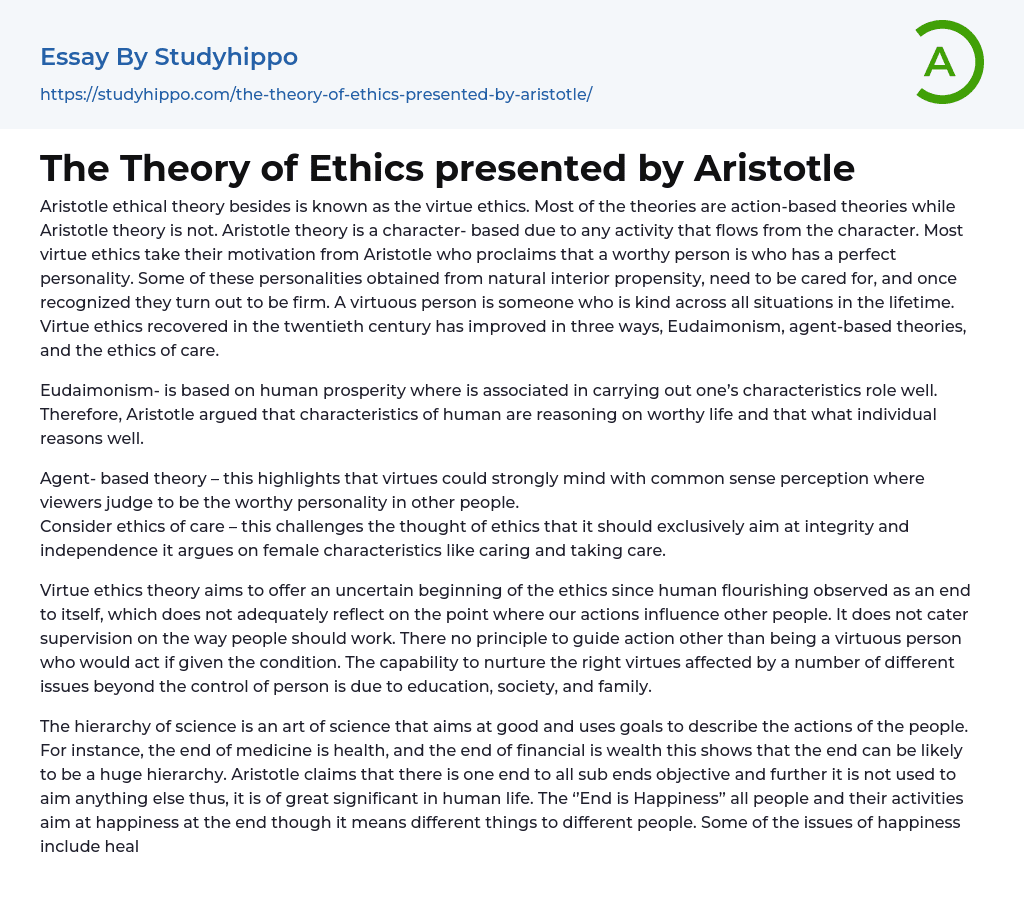

The Theory of Ethics presented by Aristotle Essay Example
Aristotle's ethical theory is also known as virtue ethics.
Most of the theories are action-based, but Aristotle's theory is character-based, focusing on the actions that stem from one's character. Many virtue ethics theories are inspired by Aristotle, who believed that a virtuous person possesses a flawless personality. These virtues are derived from innate tendencies, which must be nurtured and can become steadfast once recognized. A virtuous individual consistently displays kindness throughout their lifetime. In the twentieth century, virtue ethics has evolved in three ways: Eudaimonism, agent-based theories, and the ethics of care.
Eudaimonism is a philosophy that focuses on human prosperity and the idea that individuals should strive to fulfill their roles effectively. According to Aristotle, a worthy life involves reasoning well, which is determined by an individual's unique characteristics. Agent-based theory sug
...gests that virtues can be perceived through common sense and judgment, allowing us to identify admirable traits in others. The ethics of care challenges the notion that ethics should solely prioritize integrity and independence, emphasizing the importance of caring and nurturing, traditionally associated with feminine qualities. The theory of virtue ethics seeks to provide a vague starting point for ethics, as it places value on human flourishing as an end in itself, without fully considering the impact our actions have on others.
The text emphasizes the absence of supervision and guiding principles in people's work, except for being virtuous. The ability to acquire the right virtues is influenced by external factors like education, society, and family. The hierarchy of science employs a scientific approach to achieve favorable outcomes and uses goals to shape people's actions. For instance, health is the goal of medicine while
wealth is the aim of finance, indicating that the hierarchy of goals can be vast. Aristotle asserts that there exists one ultimate objective for all subordinate objectives which serves no other purpose but holds immense significance in human life.
The ultimate goal for all individuals is happiness, even though its definition may vary among people. Happiness can be achieved through various factors such as health, wealth, virtue, and honor. However, according to Aristotle, a life solely focused on money-making restricts our potential for true happiness. In fact, wealth can sometimes become a burden rather than a source of fulfillment. Ultimately, happiness cannot be obtained through wealth alone.
Teaching promotes intellectual virtue, which necessitates both intelligence and time. The practice of engaging in good activities leads to the development of moral virtue. In order to perform good actions, happiness relies on external goods. Due to their lack of reason, animals and people cannot partake in the activity of happiness together. The ultimate goal is to cultivate excellence in action, ultimately resulting in happiness.
According to Aristotle's ethical principle, excessive exercise is detrimental to one's health. However, what constitutes as excessive varies between individuals. Achieving the balance in every action is uncommon and difficult for many, as striking this balance enables individuals to attain happiness.



